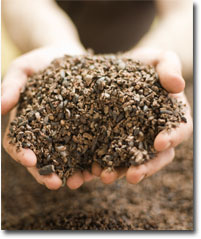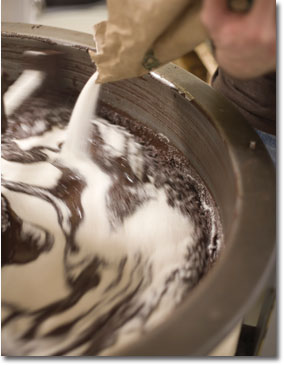A New, Old Kind of Chocolate
By Veronika Ruff ’01
Americans will spend close to $3 million on premium chocolate this year — an 11 percent increase from 2008, according to market-research firm Mintel. As our taste for fine, dark chocolate continues to expand, Alex Whitmore ’99 is confident we’re ready for something new — or rather, something old.
Taza Chocolate, Whitmore’s Somerville, Massachusetts-based “bean-to-bar” chocolate company, is the only American outfit making small batches of 100 percent stoneground, organic dark chocolate in the Mexican tradition. This results in texture and flavor characteristics decidedly distinct from chocolate made in the European tradition, which most of us are used to. Since cacao beans are indigenous to the Americas, the Mexican approach to chocolate is much older and simpler, requiring less processing, Whitmore says. “Europeans applied modern refining techniques, such as conching, resulting in ultra-smooth chocolate, often with candy or confection additions,” he explains. “We don’t do that.”
After selling its first bar in February 2007, Taza has grown steadily with a focused product line now sold at 550 outlets in the U.S. and Canada — largely specialty and natural food stores, as well as bookstores, wine and cheese shops, and, of course, Whole Foods. Though Whitmore and his business partner (his former boss at another successful Boston start-up, Zipcar) have quickly expanded the business — hiring 15 full-time employees and taking over more factory space — they are still intimately involved in each step of the process.
Whitmore, an anthropology major, says that he applies the ethnographic skills and “whole-person education” he got at Vassar to his efforts in running a socially responsible business. He sources his ingredients directly from farmers or farmer-owned cooperatives in the Dominican Republic, Mexico, and Costa Rica, paying a premium above even fair-trade prices as an incentive for the highest quality ingredients.
Taza imports cacao beans in special doubled bags Whitmore found to maintain ultimate freshness — they’re usually used to ship grains, not cacao. He also dresses the granite millstones used to grind the cacao, a secret artisanal process he learned by studying under a molinero (a stone miller) in Oaxaca. It’s the rough surface of these stones that allows unrefined cacao and sugar to remain in the finished products, giving Taza chocolate its unique, granular textures and intense flavors. Taza employees roast, winnow, grind, temper, mold, and wrap their chocolate by hand in their energy-efficient factory; and whenever possible, deliveries are made via bicycle. You can order yours at tazachocolate.com.
— Veronika Ruff ’01
Have comments about this article? Email vq@vassar.edu



